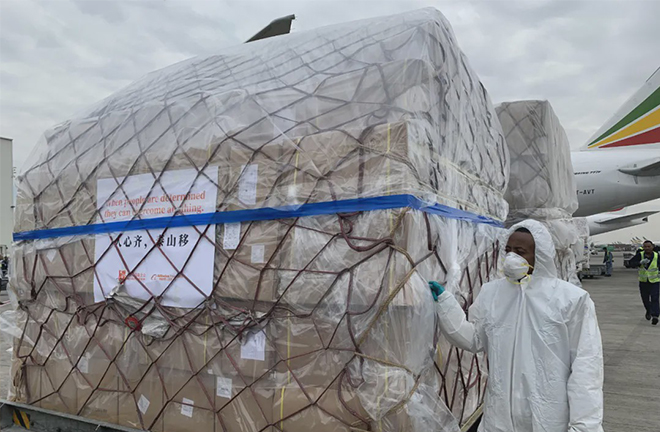Cooperation at core of global public health security

Pandemic prevention materials from China photographed at the International Airport in Addis Ababa, Ethiopia. Photo: Wang Shoubao/XINHUA
After the COVID-19 pandemic broke out, the Chinese people have made a concerted effort to battle the virus. This smokeless war has won the support of most countries and international organizations. Chinese President Xi Jinping stressed the need to “work closely with the WHO and strengthen exchange and cooperation with relevant countries on pandemic prevention and control, as well as continue to offer help as long as China’s ability allows.” Xi has spoken with foreign leaders on the phone many times and expressed China’s willingness to strengthen international cooperation in the fight against the pandemic and overcome difficulties together. The virus has no borders, and all countries in the world exist in a community of shared future. Only through solidarity and cooperation can the international community overcome the pandemic in the short term so as to jointly safeguard global public health security.
Epidemics have existed since ancient times, but in the past they were basically confined to a particular country or region. With increasingly convenient transportation, the constant strengthening of international trade and the rapid development of the tourism industry, the global flow of people and materials is increasingly prominent. The world thus has become a “global village.” In this context, an infectious disease that strikes a certain country or place can easily evolve into a world pandemic. The COVID-19 pandemic is just such a global challenge, which urgently necessitates all countries to fight collectively against it. International cooperation can be conducted by sharing virus information and anti-pandemic experience, sending medical teams to those countries in need, providing epidemic prevention materials, and strengthening scientific and technological cooperation in epidemic prevention. At the same time, as the world’s largest intergovernmental health organization, the WHO needs to fully play its role in coordinating global health affairs.
China has been a promoter and practitioner of international cooperation regarding global public health. After the outbreak of the pandemic, China took action and directed its full effort into a series of highly effective measures to curb the spread of the virus. Chinese scientists soon identified pathogens and shared the information on the viral gene sequences with the WHO and other countries. At the same time, the Chinese government has placed a high premium on disclosing virus information in a transparent way and giving timely updates on the pandemic situation to other countries. China’s strict prevention and control measures have protected the health and safety of its people. The director-general of the WHO Tedros Adhanom Ghebreyesus said that we would have seen many more cases outside China by now if it was not for the government’s efforts. China deserves the international community’s gratitude and respect for having taken very serious measures to contain the novel coronavirus outbreak, he said.
Many of China’s prevention and control measures far exceeded what an emergency response requires. In the anti-virus process, China has continuously strengthened international cooperation on antiviral drug and vaccine research and development. While doing well in its own virus containment efforts, China has actively supported other countries in the fight and offered help to other countries and regions as its capacity has allowed.
To overcome the pandemic requires a good atmosphere of international public opinion. Sympathy and support is conducive to inspiring the morale of the people of the worst afflicted countries in fighting against the virus. Discrimination and stigmatization are harmful and do no good. In face of the global public health crisis, the strengthening of pandemic prevention cooperation is conducive to not only maintaining global and regional public health security, but also promoting the construction of a community of shared future. China’s anti-epidemic assistance has been recognized and supported by most countries and international organizations in the world. Since the outbreak of the pandemic, leaders of various countries and heads of international and regional organizations have praised China’s anti-pandemic response as a major contribution to world public health.
Under the strong leadership of the CPC, the Chinese people have made continuous efforts, and the situation of pandemic prevention and control across the country has been on a positive track. The acceleration and restoration of regular work and life has been continuing. In the face of the pandemic, China is ready to work with other countries to strengthen international anti-virus cooperation and safeguard global public health security and the health of the people of the world.
Ding Jinguang and Wang Mengmeng are from the College of Politics and Public Administration at Qingdao University.
edited by BAI LE
